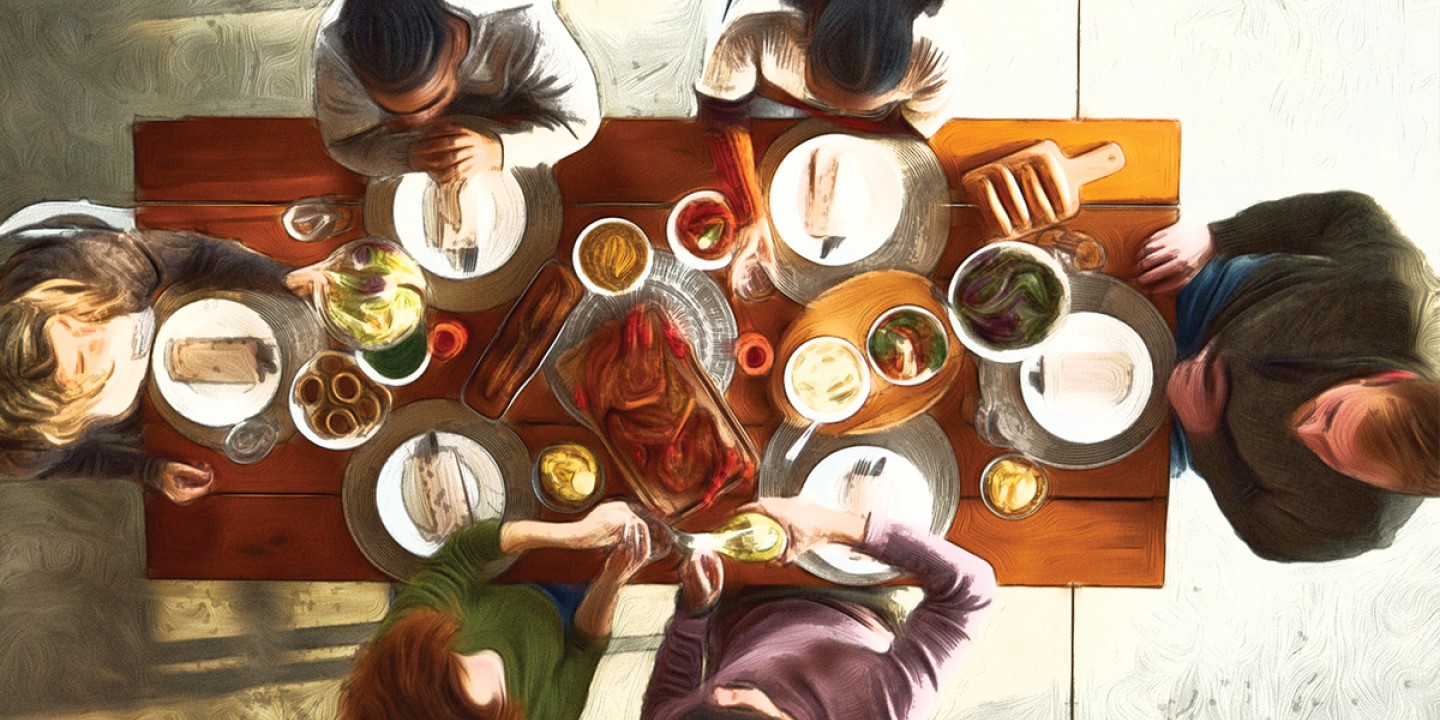Learning from the Passover Seder without co-opting it
What wisdom can Christians find in Jesus’ meal-gathering around a religious holiday of his people?

Jesus’ relationship to Passover is richly present in the biblical accounts of the meal he shares with the disciples before his death. The symbolism of his death at a time of year deep with meaning for him and his people is well explored by those writing in the early Christian tradition, both within and beyond the Bible. For Christians, Jesus and Passover are linked in a way that is difficult to set aside.
Yet for a long time, in many expressions of the church, the Jewish identity of Jesus was just that: set aside. This has had dire consequences. Erasing that identity became a convenient way for Christians to blame, denigrate, and demonize the Jewish people, with often deadly results. Christians are right to acknowledge and repent of this past and present reality.
Read our latest issue or browse back issues.
In some Christian circles, honoring Jesus’ Jewish identity has manifested in a desire to connect to Passover by holding a Seder meal. While usually well intentioned, this practice is problematic for multiple reasons. First of all, current Jewish practice of the Passover Seder began after Jews and Christians had become distinct communities. Jesus’ supper with his disciples would not have resembled a contemporary Passover Seder. What’s more, hospitality is essential to the Passover Seder, and invitations to non-Jewish friends and neighbors are common. If Christians want to experience this rich ritual, they can do so in a Jewish context. Some synagogues even offer interfaith Seders open to the community.
The Passover Seder is irreducibly a Jewish ritual. Reimagining or co-opting the Seder is not a good way for Christians to honor Jesus’ Jewish identity. The values that Jesus practices as he observes Passover, however, offer a rich model for Christians as we give thanks to God in our homes, worship assemblies, and communities. Here are a few ways we might find wisdom in Jesus’ meal gathering around Passover.
We encounter a call to embrace small gatherings of believers. Jesus gathers his friends, his chosen family, in a home to celebrate, eat, and share teaching. One lesson of the pandemic is that while large gatherings continue to nourish and inspire, small ones are important, too. And as many congregations get smaller, such gatherings matter more and more. Small group movements are nothing new, of course. Gathering simply to share a meal and talk about faith, life, and scripture has long been an access point for new community members, and it builds up the long-timers as well.
Festivals and holidays can offer opportunities to try out a smaller gathering. The Passover Seder that emerged after Jesus’ time embraces intimate ritual that builds a sense of belonging, even among the newest guests. Christian practices of gathering friends and neighbors to bless holiday meals and gatherings, new homes, and life transitions can empower us to practice the deep hospitality of Jesus’ own Passover practice. How can we talk about faith, memory, and hope in small gatherings for Christmas or Easter dinner? Birthdays and anniversary parties? Housewarmings and retirement parties? Christians can find inspiration to invite others to celebrate and give thanks outside Sunday worship.
We encounter the power of both offering and receiving hospitality. While hospitality is essential to Sunday worship, it can also be practiced in different ways in the context of smaller gatherings with meals. Single people have the opportunity to interact with families and children directly; seniors and younger people can forge relationships; class barriers can begin to weaken in life-giving ways. Indeed, Jesus’ disciples came from a variety of ways of life. We too can ritualize this kind of meal hospitality in our gatherings.
We encounter the opportunity to ritualize the ordinary. The particular flavors of the Passover Seder have ritual meaning for the Jewish people. But any meal can evoke unity and diversity in the ordinary foods shared by those present—especially if they help prepare common foods from their own households or take turns providing the meal. Meals represent a person or family’s history, culture, and traditions. Just as the Passover meal evokes memory and the sharing of stories, so do the foods prepared and shared by diverse Christian communities.
We have an opportunity to think about the power of food and eating. The beauty of ritualized meals is that they need not be complicated to enable spiritual conversation and exploration. A close look at food itself, how it arrives at our tables, and the global crisis of food access and distribution can encourage Christians to consider the ethics of how and what we eat—and of how justice is practiced in our communal discernment and action around food.
We are called to reexamine who’s really welcome and what that really means. If a given community’s demographics prevent the gatherings from being meaningfully diverse, that gives such gatherings pause to consider why. The context of the meal provides an opportunity for those gathered—especially guests who are not regular participants in a worshiping community—to share in a safe place whatever questions or experiences might stand in the way. These meals can awaken Christian communities to more deeply understand their community context and the generational realities that inform the exploration of faith in a particular time and place.
We are invited to respond creatively to changing contexts that call for the building of new relationships with our neighbors. By exploring our own traditions’ responses to this human need for ritualized community around eating together, we can draw inspiration from Jesus as host. Aware of the trials to come, Jesus creates an environment in which to impart the values of the reign of God upon his followers. Even if they are unaware of it at the time, Jesus is imparting values of inclusion and forgiveness that they will later remember. The impact of that meal is at the center of communion in most of our traditions, but it is also expressed in other Christian meals. This contextual creativity around eating together helps us ritualize the intimacy of life together.
Jesus’ meal gathering around Passover offers values for Christians to embrace—by exploring and embracing our own Christian history and rituals. In doing so we arrive not at a Passover Seder of our own construction but at contemporary expression of the love feast or agape meal tradition. The earliest Christian communities practiced a variety of communal meal rituals, some with communion and many without. This practice has hardly disappeared; it can still be found among Christian communities old and new, from Moravians to the dinner-church movement.
Jesus’ practice informs all these meals and models, and his last meal with the disciples in particular can inspire Christians to reclaim, reimagine, and reinvigorate our own practices around the communal, ritual meal. Such practices can help us seek justice, welcome new neighbors and friends, challenge sinful barriers, and celebrate milestones and ordinary life—all without co-opting our Jewish neighbors’ religious practices.






